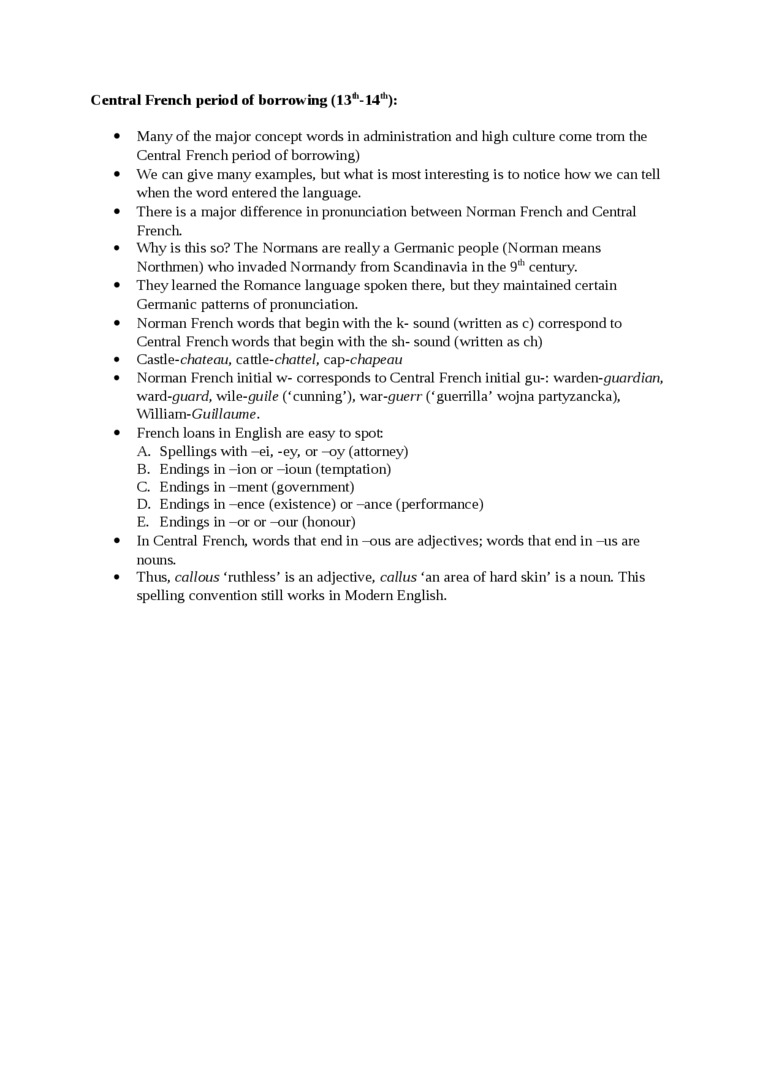95477

Central French period of borrowing (13*-W*):
• Many of tlie major concept words in administration and liigh cultnre come trom the Central French period of borrowing)
• We can give many examples, but what is most interesting is to notice how we can tell when the word entered the language.
• There is a major difference in pronunciation between Norman French and Central French.
• Why is this so? The Normans are really a Germanie people (Norman means Northmen) who invaded Normandy from Scandinavia in the 9* century.
• They learned the Romance language spoken there, but they maintained certain Germanie pattems of pronunciation.
• Norman French words tliat begin with the k- sound (written as c) correspond to Central French words tliat begin with the sh- sound (written as ch)
• Castle-chateau, cattle-chattel, cap-chapeau
• Norman French initial w- corresponds to Central French iiiitial gu-: warden-guardian, ward-guard, vń\e-guile (‘ciuining’), war-guerr (‘guerrilla' wojna partyzancka), WilWam-Guillaume.
• French loans in English are easy to spot
A. Spellings with -ei, -ey, or -oy (attorney)
B. Endings in -ion or -ioun (temptation)
C. Endings in -ment (goveniment)
D. Endings in -ence (existence) or -ance (performance)
E. Endings in -or or -our (honour)
• In Central French, words that end in -ous are adjectives; words that end in -us are nouns.
• Thus, calloiis Tuthless’ is an adjective, callus ‘an area of hard skin' is a noun. This spelling coiwention still works in Modern English.
Wyszukiwarka
Podobne podstrony:
71885 temperatura rosy 150 Fięr 18. Acid dew-point as a function of tlie sulplnu’ eon tent in tlie f
50,51 S E C T I u IN DTypes of illness Replace the words in bold type (1-26) with a word frorn the l
Coniple words - are of two major types: words madę from a basie stem word with the addiction of an a
* * * * * * ; lias been one of tlie most influential writets in the last centuiy. One of the tłiings
42619 skanowanie0002 (143) Gram mar 1w Order of adjectives 1 Put the words in the correct order to m
3 ANSEX 13 P. 3 of 7 Th* Vegetable Crope Research Advleer would ba rcąulred for a period of three ye
Tab. 13 Assessment of the period of duration of an opportunity Tab. 13 Ocena okresu
Norman Frcnch period of borrowing (11*-12* century): • Religious terms: prophet, s
IVo I)ro.nl periods of word-borrowing in Old English: • Continental: •
- the period of a still lasting warm forest climatc are most substantially marked in
after recnticality, there was a sharp increase m T(fuel)-max over the period of extra “emergency” co
6. Dudley Andrew, Mists of Regret: Culture and Sensibility in Classic French Film,
Skan! Shoes from London sites, 1100-1450 In this chapter shoe fashions in London over a period of 35
więcej podobnych podstron